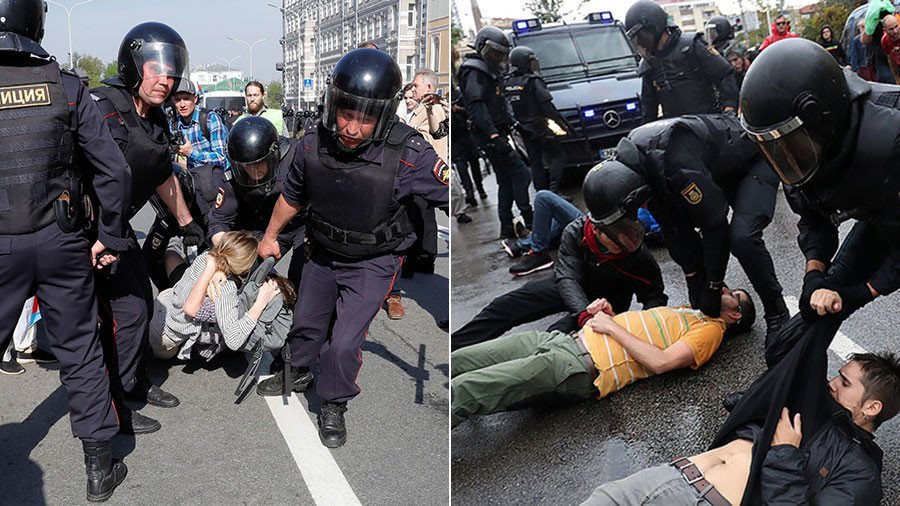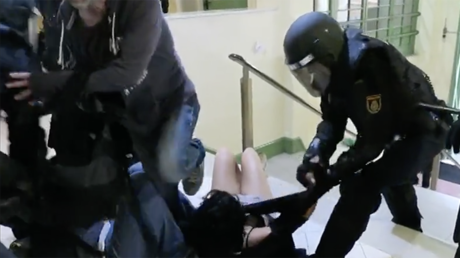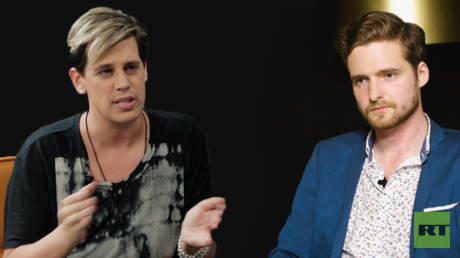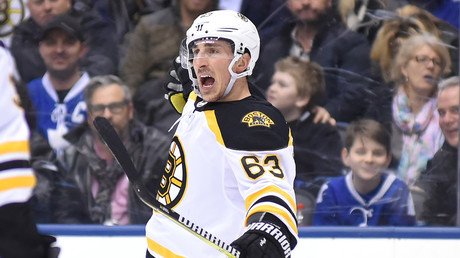EU slams police 'violence' at Russian rally, yet sides with authorities in Catalonia crackdown

The EU has released a statement condemning police "violence" at an unauthorized opposition rally in Russia. Seven months earlier, Brussels took a different view on brutal crackdown on peaceful protesters in Catalonia.
"The detention of over a thousand demonstrators and violence used against them by the Russian authorities across the country today threaten the fundamental freedoms of expression, association and assembly in the Russian Federation," the European Union said in comments released as the last protesters were leaving venues across Russia on Saturday.
While acknowledging that "some of the demonstrations [in Russian cities] were not authorised," the EU condemned the "police brutality and mass arrests."
Людей в Москве всё больше! Идут по Страстному бульвару. #ОнНамНеЦарьhttps://t.co/XPSE9PAvsPpic.twitter.com/3fnwJgnkCs
— Навальный LIVE (@navalnylive) May 5, 2018
One might expect images of bloody noses, injuries, tear gas, or something similar after this harsh rhetoric. However, photos and videos from the protests that circulated online and in newscasts showed people with their hands locked behind their backs, flanked by officers, police forming a line and pushing the crowd back, some running with their batons up. There are a few pictures of skirmishes between protesters and their opponents. So far there have been three reports of bruises received during the protest.
Пермь сегодня великолепна!#ОнНамНеЦарьpic.twitter.com/PXVO3Otqr3
— Команда Навального (@teamnavalny) May 5, 2018
Жёсткое задержание Алексея @navalny на Пушкинской площади! #ОнНамНеЦарьhttps://t.co/XPSE9PAvsPpic.twitter.com/GNP5l51r0k
— Навальный LIVE (@navalnylive) May 5, 2018
A video of Alexey Navalny being arrested and carried by police went viral, as is the case with all videos of his arrests, which tend to look similar.
The event drew a great deal of attention in the mainstream media, with headlines screaming about "sweeping protests" and Navalny's arrest. The opposition figure, as well as nearly 80 percent of those detained, were soon released.
Now let's go back to October 1, 2017 – the day of the independence referendum in Catalonia and a peaceful demonstration. Images from that day show officers beating unarmed demonstrators with batons and deploying rubber bullets.
Over 800 people were injured, some seriously, in clashes with police. Human rights groups, including HRW and Amnesty International, condemned the police brutality.
But the EU was not as critical and quick to judge on that occasion. A statement from Brussels on the situation in Catalonia came around 24 hours later after the outcry on social media. The first four paragraphs of the rather dry text branded the referendum "illegal" and did not mention police violence at all.
🔴 Tensió entre la @policia i els @mossos#1OCatRàdio#CatalanReferendum ▶️ https://t.co/UGElG7XBcGpic.twitter.com/y32AWT4Zfh
— Catalunya Ràdio (@CatalunyaRadio) October 1, 2017
Not until the last paragraph did the EU briefly note that "violence can never be an instrument in politics" and that Brussels trusts the leadership of Prime Minister Mariano Rajoy "to manage this difficult process."
Spanish police attacking Catalan firefighters who were trying to protect #CatalanReferendum voters. pic.twitter.com/3ipPH3X5jL
— Catalans for Yes 🎗️ (@CatalansForYes) October 1, 2017
Y esto por querer votar. ¿Y contra los corruptos? Los corruptos son precisamente los que dan las órdenes de golpear. pic.twitter.com/TE3qsYbvpn
— Alberto Garzón🔻 (@agarzon) October 1, 2017
By "difficult process," Brussels was apparently referring to what the media called"a massive crackdown on Catalonia independence vote." People with blood-stained bandages, some dressing head wounds, broken fingers, and injured eyes due to tear gas – these were typical scenes in Catalonia at that time.
Days after the crackdown, First Vice President of the European Commission Frans Timmermans said that "it is a duty for any government to uphold the rule of law."
"This sometimes does require the proportionate use of force," he added.
In general, the EU considered the events in Catalonia "an internal matter" for member-state Spain. Protests in Russia, a non-EU country around 1,800km from Brussels, apparently matter more to the European Union.
According to Matt Carthy, MEP from Ireland, the response from Brussels on Catalonia was "pathetic."
"Had this happened in the Middle East or in South America or if this happened in some of the new member states, we would have EU members and leaders lining up with the most vicious words of condemnation," Carthy told RT.
'Creating news for the international press'?
Navalny, who was banned from taking part in the March presidential election due to a pending five-year suspended sentence, called on Russians to hold a day of protests across the country on the eve of Vladimir Putin's inauguration, scheduled for May 7.
"There is no surprise that [Navalny] called upon his supporters to demonstrate. They would do this automatically on every occasion they can," Russia analyst Martin McCauley told RT.
The authorities in Moscow had offered the organizers several venues for the protest, but all options were rejected – including Sakharov Avenue in the center of the capital, which had already hosted a massive rally in support of banned internet messenger Telegram. Since the actual venue was not authorized, police had the right to detain the demonstrators, according to McCauley "Technically [the demonstration] was illegal and everyone participating in it could technically be arrested."
Navalny, often called "Putin's critic" or even "Putin's sole political nemesis" in the mainstream media, urged his supporters to descend on Tverskaya Street, claiming the "constitutional right" to gather wherever and whenever they want. The city accordingly warned the protesters that the venue where they were planning to march was unauthorized.
McCauley believes that by organizing protests such as this, the infamous Russian opposition activist merely wants "to create news for the international press, for the Russian press and for the people in Russia."
"If they [police] use force, it would be filmed and [will] go around the world… From Navalny's point of view, that would be a great success."















